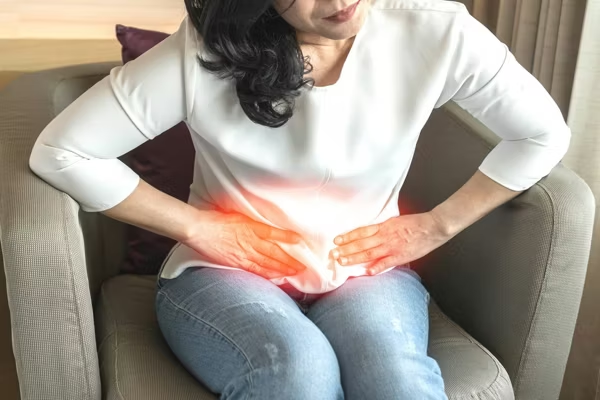By JP Summers
This post is part of HealthyWomen's Real Women, Real Stories series.
As far back as I can remember, Christmas was the one holiday I looked forward to celebrating every year. It has a lot to do with all the time-honored traditions my family shares in—eating homemade tamales, Mexican bingo, staying up till midnight to open our gifts and trading stories about our silliest moments from Christmases past.
Despite not being able to spend every Christmas with my family in Texas, I had every intention of re-creating some of those same memories for my children so they could pass those things on to their own kids one day.
I just never imagined I'd be making most of those memories while living with three types of chronic invisible illnesses: vestibular migraine, rheumatoid arthritis and fibromyalgia.
The moment my body made it clear it had its own set of rules to control my physical limitations, I knew it was time to come up with a plan to make life easier to navigate.
I couldn't stand the thought of being stuck in bed or not being able to cook a huge feast for my family. Cookies needed to be made, and those hard-to-find presents had to be hunted down. I refused to allow my health to get the better of me!
After living with my chronic illnesses for the past six years, I figured out a low-fail plan that makes executing all those seasonal tasks less stressful on me and my body.
Have Comfort and Medical Essentials on Hand
This is a must for anyone living with a chronic illness. I previously had an emergency migraine bag that I took everywhere with me. Now, I have a variety of items that have successfully helped me through a medical crisis while I on-the-go.
1. Medications: Even if I'm going just a mile down the road to run an errand, I always have all my meds on hand. You honestly never know when your body will act up. It's better to have them readily available to avoid an unnecessary medical-related crisis.
2. Ear plugs: I get severe phonophobia (sensitivity to sounds) during a fibro flare-up or when still reeling from a migraine attack.
3. Sunglasses: Since being diagnosed with chronic migraine six years ago, I now experience terrible photophobia (sensitivity to lights) at least 75 percent of the time. Some of it is due to my fibromyalgia. I can't go anywhere without sunglasses.
4. Boost Oxygen: I experience light-headedness, vertigo and nausea quite often. Using Boost Oxygen (an over-the-counter canister filled with 95 percent pure enriched oxygen) has been a lifesaver. I carry both sizes of the containers with me, and whenever I feel one of those symptoms coming on, I take a few puffs, then continue with my tasks. The peppermint flavored boost does wonders for my nausea, too. Nine out of 10 times it goes away. That's odds I can live with—especially when I'm around people and the last thing I want is to get sick in front of them. (Editor's note: OTC canned oxygen is not meant to be a substitute for medically prescribed oxygen tanks or oxygen concentrators.)
5. Beverage: I keep a small bottle of water in case I need to take my migraine abortive medicines or other medications that help keep my pain under control. Most places have water fountains, but if you're anything like me, the sooner you take your meds, the better your odds are of not having to go home and end up in bed.
6. Cryohelmet or Cryoscarf: The Catalyst Cryohelmet is a device that applies targeted cold therapy to the head. With proper use, your Catalyst helmet may reduce inflammation from head injuries, lower body heat, and lessen migraine pain. The Cryoscarf is a frozen neck wrap and a great alternative to gel packs and other cooling options that quickly lose their effectiveness. These two products stay cold for several hours when carried in an insulated bag.
7. ThermApparel vest: This newer addition to my emergency bag has been a tremendous help with both my rheumatoid arthritis and fibromyalgia. I often get overheated and sometimes must go outside or near the freezer section of the store to cool down. Not only does this vest stay cold for up to three hours, it's very lightweight. It truly doesn't feel like you are wearing anything under your clothes!
8. Muscle rub and heat patches: I have an overabundance of these for sore muscles and inflamed joints. I even found small patches that look like bandages and easily wrap snuggly around your fingers.
Holiday Shopping Tips
Shopping is easier if you have someone to shop with. It's nice to have that extra set of hands to get those hard-to-reach objects or lift items that are difficult to hold. When that option is not available, the next best thing is to pace yourself.
Always break down your list according to how you are feeling at that moment.
Start shopping for gifts a month or two earlier. It's not only less stress on you, but your body needs all the rest and proper care it can get to make it from Thanksgiving through New Year's.
As for grocery shopping, that's a whole other experience when you're chronically ill.
There are times I can walk into a grocery store feeling like a million bucks, then 15 minutes later it's like I was run down by a bulldozer. I'm not hesitant to ask for help from the employees. Instead of running down aisle after aisle in search of an item, ask the employee if they can lead you to it—or better yet, grab the item for you.
I've noticed how large chain stores often have more places to sit. I've taken full advantage of those areas where I can rest for a few minutes. A five-minute sit-down break can help you to get through that long list and back to the comforts of your own home.
A great option is to have someone else do your shopping for you. I never turn down an offer from someone willing to do my grocery shopping. It is truly a lifesaver! My body is precious to me. I'd rather save whatever energy I have during the holidays to enjoy more things with the important people in my life.
A number of grocery stores now offer online shopping to help people with hectic schedules. I have yet to try it, but others around me rave about it.
Cooking Tips
Some families alternate who will host the holiday festivities while others go to the same place year after year.
Whether you get your meal catered, ask others to bring dishes or take on all the responsibilities for Christmas dinner, it helps to plan your tasks days in advance.
The weather plays a huge part in how I'll function during planned festivities. I've learned to prep my menu items at least two days ahead to significantly make it easier on my entire body. For example, I'll peel potatoes, rinse, then set them in water overnight. The next day, I'll drain them, add new water and boil them. I even ask someone else to do the mashing so that's one less strenuous thing I need to do.
I tend to get light-headed or overheated when I'm in front of a stove for too long. I can avoid that by going the no-bake route. Buy premade desserts and serve with pretty garnishes, so it looks like you made them yourself.
Practice Self-Care
This is a must for every person trying to stay in the holiday spirit. I spend 65 percent of my time dealing with chronic pain. If I want to better my odds of attending the kids' school choir concert or a friend's Christmas gathering, I make it a point to get plenty of rest and keep that day's tasks at a minimum. Basically, I veg out in the recliner with my feet elevated and listen to soothing music or watch a show that I love. Taking care of myself first keeps my mind focused on the fun things in life and not the chronic pain I find myself battling almost daily.
Celebrate the Events That Are Most Important to You
I hate turning down an invitation to a holiday party that I know will be the talk of the town, but there are times I need to think about what commitments are most important to attend and make those my priority. My body can only handle so much.
I've tried to prove I could do it all—only to not make anyone's events. I ended up spending several days fighting massive fibro flare-ups and nasty migraine attacks. That is not how anyone wants or deserves to spend their holidays.
What works best for me is committing to one event a week. If there are several things going on at once, I consider which ones I missed in the past or which will have people I haven't seen in a long time. Most people know of my medical status and understand I must limit my outings. It's family and friends like those you need to try your best to spend time with over the holidays.
What matters the most is your overall well-being. Please take those extra steps to make things less chaotic this holiday season. Your body will appreciate it!
JP Summers blogs at Adventures of a Spoonie Mom. Adventures of a Spoonie Mom is about JP and how she navigates through life with migraine, cluster headaches, fibromyalgia and osteoarthritis while being a single mom, a caregiver to a teenager who lives with chronic migraines, cook, writer, crafter, travel enthusiast and geek at heart.






